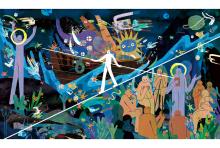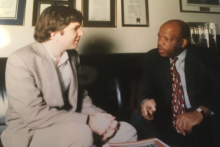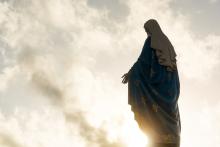Love

In the weeks leading up to the inauguration, Sojourners’ 41st class of fellows gathered to study bell hooks’ prophetic book All About Love . In her writing, hooks not only exposes the structures underpinning systems of oppression but illuminates paths toward dismantling them. Her primary tactic is one we don’t hear much about these days: love.
Published in 1999, All About Love could just as easily have been written amid today’s political upheaval. Hooks calls out fear as a defining issue of our time: “As a culture we are obsessed with the notion of safety. Yet we do not question why we live in states of extreme anxiety and dread. Fear is the primary force upholding structures of domination.”

In July of last year, an estimated 50,000 fans flooded Arrowhead Stadium in Kansas City to see Taylor Swift’s Eras Tour concert. Among those in the crowd was football tight end Travis Kelce, eager to woo Swift. Arrowhead has been central to Swift and Kelce’s romance ever since: After making their romance official last September, Swift has routinely joined the 76,000 Chiefs fans to cheer for Kelce and his teammates. From concertgoers to sports spectators, the thought of that many people in the same space is difficult to imagine. Equally hard to imagine, and significantly more heartbreaking, Israel Defense Forces have killed 25,000 Palestinians since Oct. 7, 2023; that number of people would fill about a third of Arrowhead Stadium.
This is a jarring image, but such is the reality of our present moment: While the state of Israel carries out a genocide against Palestinians, we are easily distracted by our adoration for Swift and Kelce, along with spectator sports.

“They will not hurt or destroy on all my holy mountain...” —Isaiah 11:9

JEWISH NEW TESTAMENT scholar Amy-Jill Levine claims that all religions are a little bit supersessionist. Christian supersessionism — which understands God’s covenant with Christians to nullify God’s covenant with the people of Israel — has been so mainstream throughout most of Christian history that it has hardly required articulating. It was just the anti-Jewish water in which we swam. Following the Holocaust, however, Christians recognized how much we’d weaponized supersessionism into antisemitism, which provided support for Nazi and white supremacist ideologies and perpetuated anti-Jewish violence. Unfortunately, Levine argues, no exegetical maneuver can fully expunge supersessionism from the New Testament — though many have tried. It’s there. And the authority of God’s word in Christian lives keeps its dangerous power ever-present.
Still, Paul’s letter to the church in Rome (which we read this month) contains Paul’s own grappling with these questions. Chapters 9 to 11 — wherein Paul corrects some of the Gentile converts who think God has now rejected the covenant with Israel — comprise the hook on which most contemporary attempts to dismantle supersessionism hang their hat. So, we’ll pay special attention to these.
This isn’t going to be an easy fix — particularly for Christians (like me!) who want to hold fast to the gospel, atone for complicity with antisemitism, and stand in solidarity with Palestinians under occupation. Still, I trust God’s promises: I believe both that God’s covenant with Israel endures and that Jesus is the Messiah. So, this month, we are going to sit with the discomfort of failing while attempting the impossible. Because, in trying, we might find a new way through.

WHEN EMILY DICKINSON first read the novel Jane Eyre, she didn’t know the name of its author. At the time, Charlotte Brontë wrote under the pseudonym Currer Bell, and her work was the subject of controversy. The British Quarterly Review referred to Bell as “a person who ... combines a total ignorance of the habits of society, a great coarseness of taste, and a heathenish doctrine of religion” and said, “the tone of mind and thought which has overthrown authority and violated every code human and divine ... is the same which has also written Jane Eyre.”
When Dickinson returned Jane Eyre to the friend who lent it to her, she sent it with a bouquet of box leaves and a note that makes it clear she’d heard the gossip on Bell. She wrote, “If all these leaves were altars, and on every one a prayer that Currer Bell might be saved — and you were God — would you answer it?” Years later, when Brontë died, Dickinson wrote the following elegy: “Oh, what an afternoon for heaven, / When ‘Brontë’ entered there!”
As Dickinson’s biographer Alfred Habegger notes, this elegy not only grants Brontë salvation but also “made heaven the beneficiary.” Even in these brief notes on Brontë, we can see some of the common themes of Dickinson’s poetry. There is the impulse to engage with (and even affirm) the ideas of God and heaven but also the impulse to subvert rigid and exclusive notions of theology.

WHEN VILLANOVA PROFESSOR Vincent W. Lloyd reflects on the theology of the phrase “Black Lives Matter,” he begins with the “death-dealing forces of white supremacy” and the tragic “ vulnerability to premature death” experienced by Black people. But Lloyd doesn’t stop there. To affirm the value of Black lives, Lloyd writes, requires life that is rich, creative, and flourishing.
Lloyd doesn’t think such flourishing is possible without faith. Specifically, he argues that to hold on to “a hope against hope” in the face of these noxious, murderous systems and practices requires belief in the possibility of life after death: “For Black life to matter,” Lloyd writes, “we must believe in resurrection.” As Carmen Acevedo Butcher puts it in her interview with Betsy Shirley, “It may not look like it,” but “Love’s in charge.” That’s an important reminder for all of us, in this Easter season and always.
On a lighter note: We’re pleased to have a guest appearance by our former art director (and humor columnist) Ed Spivey Jr., who came out of retirement to offer his pearls of wisdom on artificial and other kinds of intelligence.

“THE SPIRITUAL LIFE, in other words, is not achieved by denying one part of life for the sake of another. The spiritual life is achieved only by listening to all of life and learning to respond to each of its dimensions wholly and with integrity.”
In this quote from Wisdom Distilled From the Daily: Living the Rule of St. Benedict Today, Joan Chittister writes about living a spiritually active existence that fully engages with our daily reality. She couldn’t have known it at the time, but Chittister might as well have been describing one of the biggest pop culture trends of the last few years: the multiverse.
The concept of multiple worlds and multiple versions of ourselves (some of whom live the life we secretly wish we had) has become ubiquitous across screens, from movies like Doctor Strange in the Multiverse of Madness and Spider-Man: No Way Home to TV shows like Rick and Morty and Doctor Who. Perhaps the example of multiverse storytelling to most successfully plumb emotional possibilities so far — listening to all of life and responding to its dimensions with integrity — is also one of 2022’s most surprising hits: the indie film Everything Everywhere All at Once.

This weekend marks the 56th anniversary of the Selma march.

As people of faith, our blood should boil when we hear people try to say our God is for marriage segregation.

Revelations are supposed to happen on roads. Prophecies on the road from Delphi. Epiphany on the way to Judah. Miracles on the road to Damascus. You don’t expect them to happen on empty highways in East Texas.

So when we seek direction, remind us what is true:
the Advocate is with us to help us follow you.
Christ, guided by the Spirit, may we your people be
A loving, faithful witness in this community.

In deep thirst, a desert stag will tear
open saguaro ribs with his teeth
and gorge on succulent heart, living sap.
This morning desire and grief for You
are the same ache. Welcome, hurt.
Enter and feast on my flesh. Become love.

And I can’t help but think about my friends on “life” row who live daily in that space. They know that their execution dates can be set at any moment, but they also know that they are alive now and have to live into as much of the fullness of the day as they possibly can. It can be difficult, at times, to sit in the liminal space with my friends, as I never know which they will choose — will they choose life or will they choose death to discuss? And the truth is that they pick both. They need to process their death while they are living. And they have to process their living while they know they face a certain death.

BEFORE WE GET to the best movies of 2018, let’s talk about the most memorable moments of this year in cinema. Neil Armstrong casting his daughter’s bracelet into a canyon on the moon in First Man, a story as much about one person’s grief and desire to connect with another as about our species’ ambition and desire to conquer the final frontier.
The dawning realization, in What They Had, of why Robert Forster steps out of the bedroom he has shared with Blythe Danner for 60 years, sparing her more suffering and loving her until the end.
A deceptively simple scene—a conversation in a car going from one neighborhood to another—that’s a revelation of social inequality and how near yet far we live from each other. In minutes, Widows covers centuries of relationships of power.
An unexpected funeral in The Gospel of Eureka that breaks the audience’s heart and calls forth our loves.
And the titular character Christopher Robin, who holds Pooh Bear’s hand as they walk through a field, as though Terrence Malick is directing the film.

The Jesus story begins with a young woman who also hears many critical voices around her. Mary lives in a culture that tells women they’re more property than persons. Galilee is considered the armpit of her society. Her religion portrays God as mostly a distant and disinterested deity.

Anything can label itself as being “Christian,” so we must always look to the person of Christ to guide us, because he already laid out a life for us that perfectly reflects what it means to be God incarnate on earth. Christ is everything.

Roaring lions that tear their prey, open their mouths wide against us. They beat us, arrest us, incarcerate us, shoot us, then blame us. We are poured out like water, and all our bones are out of joint. Our hearts have turned to wax; they have melted within us.

As I’m reading this scripture with my friend on death row, he asks me to repeat the scripture again and takes my Bible to look at it himself. When you are on the row, it is almost a requirement to build up walls all around you so that you ensure that you are not inflicted with even more pain and suffering — death row is enough. He talks about all of the walls that he has built up over the years. He has become a fortified city. He wants to break free. He wants the walls to come tumbling down. But he worries what will happen if he is that vulnerable. So he looks at me and says, “I am glad God writes my name on his palm even though I have all of these walls around me.” “Me too,” I say.

I’ll treat the earth as sacred space
Name violence a vile disgrace.
Build a world of justice and peace
Help the oppressed find release.

Til chains, chairs, and chambers are no longer justices’ end
and my fellow American can call me brother, regardless of my skin,
I’m still breathing.